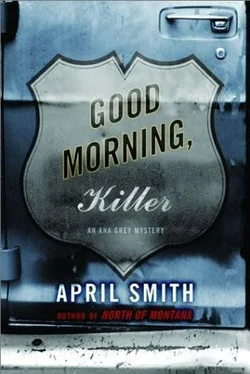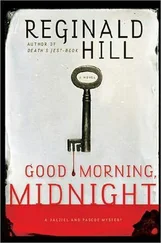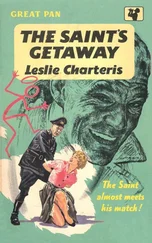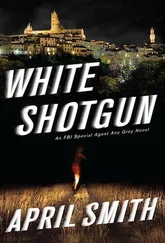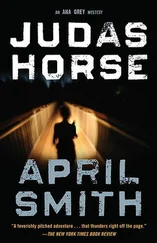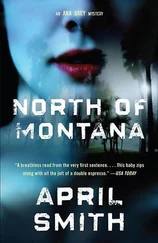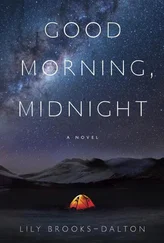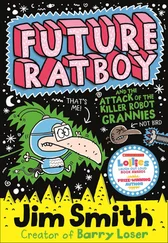April Smith. Good Morning, Killer
Ana Grey, Book 2
For my father
It was winter and I was swimming laps in the rain.
I have found it a privilege to swim outside in the rain, a perk you get in return for living in Los Angeles that not many appreciate. You have to like being extremely wet, and enjoy the feeling of smug superiority because the canyon air is forty degrees and you’re in a relatively warm bath. You have to appreciate the subtle play of vanished circles on the water and the dance of droplets off your goggles, blurring the shapes of redtail hawks resting on a telephone pole and deer moving close to the houses.
I did not know about the girl.
I was doing the backstroke, looking up at the clouds, trying not to get pushed into the lane lines by the county lifeguard who was working out beside me, with the tapered legs and the chest of a manatee. He was gray-haired, with a stroke so smooth it never seemed to break water, as if propelled by some internal muscular power known only to yogis. In fact the lifeguard was a kind of spiritual seeker and would speak of “the breath” as if it were a living thing.
My personal meditation that day was on a briefing with the senior superintendent from the Hong Kong Police Force. It would be a lunch with twenty other folks, a long ungainly table in Distefano’s, everyone trying to look spiffy and smart — a total waste of time when I had to get my files in order for an upcoming ninety-day file review, an assessment of open cases as pleasant as a cross between a migraine headache and spring cleaning. When you work the kidnap squad you find a lot of cases — mostly missing children — stay open forever.
When the red hand on the workout clock brushed 6:55 a.m., I hauled out of the water and hightailed across the frigid pool deck, raindrops popping off my silicone cap. Checking the pager hooked inside the swim bag, I found it was blinking: Code 3-PCH-AB .
Emergency.
I stood alone in the freezing cinder-block locker room, dripping freely and staring at the numbers with a secret smile. It was a message in police code from “AB” (Detective Andrew Berringer), which usually meant not a life-and-death emergency but an emergency of the gonads, which I could feel responding as I peeled off the cold clinging bathing suit and headed for the open shower.
The two other women who had been swimming in the rain (both lawyers) came hurrying in, shivery and goose-bumped, absorbed in chatter about book clubs, children, different types of olives, someone’s half-demolished kitchen, as a wild mix of botanicals — mint, eucalyptus, citrus, rose — swirled in the steamy vapor and they lathered unabashedly and shaved and loofahed, while I stood under the hot pounding spray with head bowed in thanks because of this sudden unexpected gift of seeing Andrew, even more delicious if it were to take place, let’s say, behind the locked rest room door in Back on the Beach, a café down on Pacific Coast Highway.
Where, I thought, the emergency was.
Good thing I had those ten extra minutes.
In the parking lot of the YMCA facility I passed the lifeguard, who carried nothing but a small satchel while my shoulder was crippled under the weight of a swim bag loaded with fins, towels, hair dryer and an enormous makeup kit. I was wearing a slim black pants suit and heels because of the luncheon with the superintendent from Hong Kong. The lifeguard wore nothing but a T-shirt and shorts.
“Come under my umbrella.”
He shook his head. “How’d you like your workout, Miss FBI-FYI?”
“Good.”
“Make sure you get enough air.” He inflated his lungs. “Air,” he said.
“Air,” I agreed, and got into my car to the silent buzz of the Nextel cell phone on my belt.
“Ana?” It was my supervisor, Rick Harding. “Where have you been?”
Lost in an erotic delirium, I had forgotten to check the Nextel also. Two missed messages.
“Underwater. Sorry.”
“Tell me about it, the freeway was flooded, took an hour and a half to get in. We’ve got a kidnapping on the Westside. The police department requested our assistance. You’re next up.”
Next in line to be case agent. The senior in charge.
So much for ten minutes in heaven.
“What’s the deal?”
“The victim is a fifteen-year-old female missing since yesterday. I’m going to the police department. The techs are on their way to the family residence.”
He gave me an address on Twenty-second Street, north of Montana Avenue, the Gillette Regent Square section of trendy Santa Monica. Kind of like the tenderloin of the filet mignon.
“Is that why we’re all over this?” I asked. “High-profile neighborhood?”
“It’s the ‘new politics,’” he replied, which meant yes.
“We’re sure about the kidnap? It’s not just a runaway?”
“Mom and Dad got a call early this morning.”
“Ransom?”
“The girl was pleading for her life. Then they hung up.”
“Works for me.”
“Just get over there.”
I barreled down Temescal and took a quick detour south on PCH, swinging through a puddle at the entrance to Back on the Beach. The muddy water rooster-tailed up about ten feet, completely obscuring my windshield.
Andrew was not there to witness this dramatic arrival. His burgundy unmarked Ford was parked facing the ocean, empty, doors locked. The restaurant hadn’t opened yet. Patio tables were glassy and jumping with rain, and I knew if I took one step onto the bike path my black heels would instantly become stained with saturated sand. So I waited on the asphalt under the umbrella while impertinent gusts blew at my knees and under my arms, wishing I had taken the time to blow-dry my hair, which had become uncomfortably damp in the sideways mist. I began to sneeze, that smug superiority cooling down fast, as a yellow county rescue truck, red lights pulsing, came north across the beach.
Where the hell was he?
Against the unsettled ocean and the bluster of the blue-white sky, I watched as the heavy truck pitched stubbornly over rises in the sand. Its slow progress seemed to make a statement about law enforcement: We shall override.
A pitiful thing to take for comfort.
The truck stopped past the restaurant, just out of my sight. I could hear the deep idle of the engine and feedback on a police scanner. I stepped onto the bike path. A hundred yards away I could see Detective Berringer in his trademark black motorcycle jacket, kneeling beside a bicyclist wearing bright regalia who had skidded out.
“Andrew!”
He waved me back, yakking it up with some county lifeguards in fluorescent rain gear who were bringing out a spine board. Claps on the back, handshakes, long-lost pals. Now the wind was wrapping around my legs, and I could look forward to clammy panty hose the rest of the day.
Finally, he jogged over, brushing off his hands.
“What are you doing?”
“Waiting for you. Hi, doll,” giving me a smooch. “See that lifeguard? The tall, skinny guy? That’s Hank Harris !” he said wonderingly.
“You know him?”
“I know his dad !” Andrew shook his head. “When you turn fifty, things get weird. That kid’s supposed to be eight years old, playing Little League!”
“You’re not fifty.”
I never knew anyone to add to his age, but Andrew was several years ahead of himself in an apprehension he had about “getting old,” which was ridiculous. He was adorable. Not perfect-looking (nose like a stumpy old carrot, not the tightest chin), but a rough-hewn charisma you would definitely pick out at a bar — dark wavy hair cut short and greenish eyes that could bully or tease; a face that could be a mask of detachment, then open up like a kid who just hit a home run. I believe this was the reason — an extraordinary ease with his own emotions — that Andrew was often picked by the department for public relations gigs. He was a seasoned street detective who apparently was not afraid to show what he felt. Therefore he would not likely be afraid of the deeply awful things that had happened to you. When Andrew gave workshops on bank security the female tellers would write down their phone numbers on deposit slips. He would call them back, was my understanding.
Читать дальше
